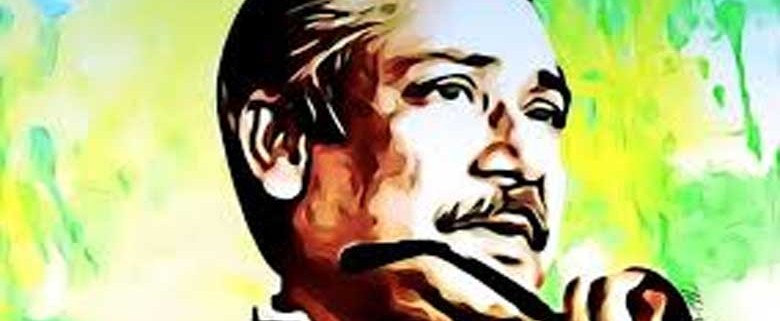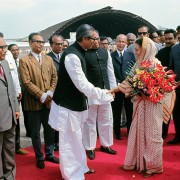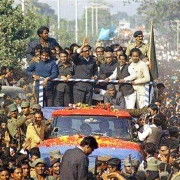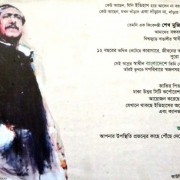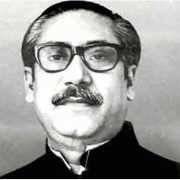Bangabandhu faced more problems than contemporary leaders: Mark Tully
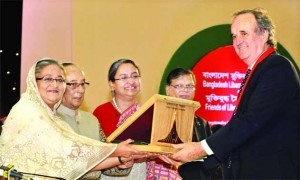 Celebrated BBC journalist Sir William Mark Tully, reputed particularly for his extensive coverage of the LiberationWar, believes Bangabandhu had to steer a new born nation facing more problems than any other leader of that time.“He (Bangabandhu) faced more problems than his contemporary leaders,” Tully said in an interview at his New Delhiresidence ahead of Bangabandhu’s 35th martyrdom anniversary.
Celebrated BBC journalist Sir William Mark Tully, reputed particularly for his extensive coverage of the LiberationWar, believes Bangabandhu had to steer a new born nation facing more problems than any other leader of that time.“He (Bangabandhu) faced more problems than his contemporary leaders,” Tully said in an interview at his New Delhiresidence ahead of Bangabandhu’s 35th martyrdom anniversary.
Tully said, “He had bigger problems-the nation was broken, then there was global economic recession, coupled withrise of prices of petroleum products.””There was the open border withIndiamaking it impossible to stop smuggling . . . he had faced more problems thanany other leaders of his time,” added Tully.
While revisiting memory lanes recalling his personal acquaintance with Bangabandhu particularly after theindependence, the British journalist described him as a leader who was “extremely friendly and open, a man who lovedhis people most.”“I found him extremely friendly and open, he was a very friendly man, a very big person in every sense of the term ofthe word,” the elderly British journalist recalled.
He also recalled the memories of Bangabandhu’s public meetings, which he had attended and said, “He (Bangabandhu)had a wonderful voice that could mesmerise the crowd. I could feel from their reactions when Sheikh Shaheb used toaddress public meetings.”
Tully recounted that he was deeply saddened 35 years ago on hearing news of Bangabandhu’s assassination when hewas working at theLondonhead office of the radio service. He was expelled fromIndiasome time before following astate of emergency in 1975 proclaimed by then premier Indira Gandhi.
“I was working in the night shift when the news of his brutal assassination came. I was obviously very sad asBangabandhu had been very kind to me,” said Tully.”Personally I was sad because when I met him for the first time, I saw the high hopes and optimism he had for hispeople and his belief in the future ofBangladesh,” said the journalist.
During his visit afterBangladesh’s independence, Mark Tully was to make some reports on the new-born country andsought an interview with the charismatic leader of the new-bornBangladesh.“Of course I wanted to interview theBangladeshleader. But I never knew he would grant permission to actually seeme so soon. I was told Sheikh Saheb was interested to meet me. We had a long discussion and he spoke a great dealabout the new-bornBangladesh,” he added.“Sheikh Shaheb told me about his determination to establish secular democracy inBangladeshand all about hisdreams.”
Tully recalled that Bangabandhu, at the very outset of the interview, thanked him for his contribution to the LiberationWar while he replied saying “I merely reported the news, many other journalists had done like me.”But Bangabandhu would not agree and at the end of the conversation he presented him with a painting, which “is stillwith me.”“I was very much touched by this gesture (the gift) and you might be knowing we (BBC journalists) are not supposedto accept gifts.””I told my BBC head office inLondonabout the gift and informed them that I would put the painting in the BBCoffice inDelhi, which I did.”
At the end of the interview Sir Mark Tully showed the painting hung in his living room. It was a painting by artistMuzimul Azim, in 1973. Asked how he managed to do so, “I simply took it from the office,” Tully quipped with a smile as the rare gift fromBangabandhu would remain a treasure to him for a long time.
Tully, recipient of ‘Padmashri Award’ from the Indian Government in 1992, said he had met theBangladeshleaderseveral times after that. But he could not recollect the number of times that Bangabandhu told him that he was upsetwith the mountain of problems.
Author : Mark Tully, New Delhi

